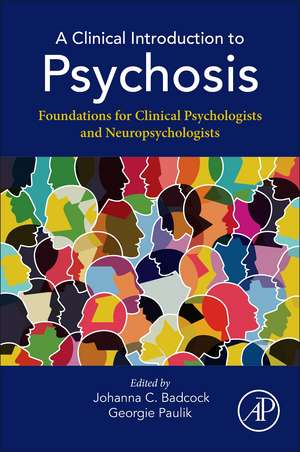A Clinical Introduction to Psychosis: Foundations for Clinical Psychologists and Neuropsychologists
Editat de Johanna C. Badcock, Georgie Pauliken Limba Engleză Paperback – 18 oct 2019
- Provides treatment and assessment methods for psychotic symptoms and disorders
- Looks at how psychosis develops and the impact of stigma on clinicians and clients
- Studies the links between trauma, PTSD, and psychosis, as well as sleep and psychosis
- Covers digital technologies for treating and assessing psychosis
- Outlines strategies for treating visual and auditory hallucinations
- Examines how to incorporate consumer and clinician perspectives in clinical practice
Preț: 500.49 lei
Preț vechi: 658.06 lei
-24% Nou
Puncte Express: 751
Preț estimativ în valută:
95.78€ • 104.00$ • 80.46£
95.78€ • 104.00$ • 80.46£
Carte tipărită la comandă
Livrare economică 16-30 aprilie
Preluare comenzi: 021 569.72.76
Specificații
ISBN-13: 9780128150122
ISBN-10: 0128150122
Pagini: 742
Dimensiuni: 191 x 235 x 41 mm
Greutate: 1.24 kg
Editura: ELSEVIER SCIENCE
ISBN-10: 0128150122
Pagini: 742
Dimensiuni: 191 x 235 x 41 mm
Greutate: 1.24 kg
Editura: ELSEVIER SCIENCE
Cuprins
SECTION 1 - THE BASICS
1. What is psychosis?
Part One: Lived experience perspectives
Past, present and future – Clair de La Lune
My Hidden Superpower - Evie Glasshouse
Part Two: Current conceptualisation of psychosis – Clinical and research perspectives
2. Models of Schizophrenia. A Selective Review of Genetic, Neuropharmacological, Cognitive and Social Approaches
3. Understanding the Impact of Mental Health Stigma and the Role of Clinicians as Allie
4. Culture and psychosis in clinical practice
5. The recovery model and psychosis
SECTION 2 - ASSESSMENT
6. Symptom assessment and psychosis
7. Negative symptoms and their assessment in schizophrenia and related disorders
8. Assessing social and non-social cognition in schizophrenia and related disorders
9. Assessing social functioning across the life course in psychosis
10. Trauma, psychosis and post-traumatic stress disorder
11. Effectively Assessing Sleep and Circadian Rhythms in Psychosis
12. Benefits, assessment and preferences of physical activity in psychosis
13. Screening and assessment of substance use in psychosis
SECTION 3 - LINKING ASSESSMENT TO TREATMENT
14. Clinical case formulation
SECTION 4 - THERAPIES
15. Cognitive Behavioural Therapies for Psychosis
16. Third Wave CBT Interventions for Psychosis
17. Cognitive remediation to improve functional outcome
18. Promoting psychosocial functioning and recovery in schizophrenia spectrum and other psychotic disorders
19. Trauma informed therapies
20. Better sleep: Evidence-based interventions
21. Get moving: physical activity and exercise for mental health
22. Treating comorbid substance use and psychosis
23. A brief guide to medications for psychosis
24. Get in early: Early intervention services for psychotic symptoms
SECTION 5 - NEW DIRECTIONS IN RESEARCH AND PRACTICE
25. Beyond belief: new approaches to the treatment of paranoia
26. Being a scientist-practitioner in the field of psychosis: Experiences from voices clinics
27. The therapeutic use of digital technologies in psychosis
28. Tracking language in real time in psychosis
29. Integrating lived experience perspectives into clinical practice
1. What is psychosis?
Part One: Lived experience perspectives
Past, present and future – Clair de La Lune
My Hidden Superpower - Evie Glasshouse
Part Two: Current conceptualisation of psychosis – Clinical and research perspectives
2. Models of Schizophrenia. A Selective Review of Genetic, Neuropharmacological, Cognitive and Social Approaches
3. Understanding the Impact of Mental Health Stigma and the Role of Clinicians as Allie
4. Culture and psychosis in clinical practice
5. The recovery model and psychosis
SECTION 2 - ASSESSMENT
6. Symptom assessment and psychosis
7. Negative symptoms and their assessment in schizophrenia and related disorders
8. Assessing social and non-social cognition in schizophrenia and related disorders
9. Assessing social functioning across the life course in psychosis
10. Trauma, psychosis and post-traumatic stress disorder
11. Effectively Assessing Sleep and Circadian Rhythms in Psychosis
12. Benefits, assessment and preferences of physical activity in psychosis
13. Screening and assessment of substance use in psychosis
SECTION 3 - LINKING ASSESSMENT TO TREATMENT
14. Clinical case formulation
SECTION 4 - THERAPIES
15. Cognitive Behavioural Therapies for Psychosis
16. Third Wave CBT Interventions for Psychosis
17. Cognitive remediation to improve functional outcome
18. Promoting psychosocial functioning and recovery in schizophrenia spectrum and other psychotic disorders
19. Trauma informed therapies
20. Better sleep: Evidence-based interventions
21. Get moving: physical activity and exercise for mental health
22. Treating comorbid substance use and psychosis
23. A brief guide to medications for psychosis
24. Get in early: Early intervention services for psychotic symptoms
SECTION 5 - NEW DIRECTIONS IN RESEARCH AND PRACTICE
25. Beyond belief: new approaches to the treatment of paranoia
26. Being a scientist-practitioner in the field of psychosis: Experiences from voices clinics
27. The therapeutic use of digital technologies in psychosis
28. Tracking language in real time in psychosis
29. Integrating lived experience perspectives into clinical practice
